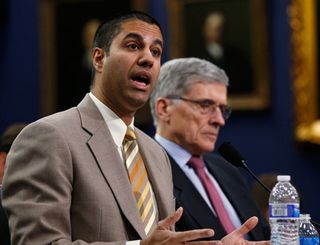Sprint Punts on Auction

Sprint's announcement last week that it will not bid in the broadcast incentive auction has some broadcasters worried. A broadcaster familiar with the auction process said the news was a major topic of conversation last week and has fueled anxiety that the FCC made a big mistake by reserving spectrum essentially for one company—T-Mobile—which is likely to get it at incredibly lowered rates, reducing the money the FCC will get to pay broadcasters for their spectrum.
Preston Padden, of the disbanding EOBC, disagrees, saying last week he thinks there will be plenty of bidders and bucks.
The FCC reserved some of the best spectrum—the spectrum it won’t be repacking broadcasters in—for AT&T and Verizon competitors including T-Mobile and Sprint. The idea was to create stronger wireless competition for AT&T and Verizon and spread some of the beachfront low-band spectrum available in the broadcast incentive auction around, given that the two major carriers have the majority of it.
While the FCC justified holding the auction by suggesting, as most carriers have, that they are in desperate need of more spectrum, Sprint said it had enough for now and the future and would be sitting the auction out, as it had the AWS-3 wireless spectrum auction.
Broadcasters were not the only ones concerned about the impact of Sprint’s exit on the auction.
FCC commissioner Ajit Pai, who dissented from the vote to establish that competitive carriers spectrum reserve, said last week that Sprint’s decision was the result of the “folly of the FCC’s attempt to pick winners and losers before the auction begins.”
Pai also said the decision “intensifies doubts about how competitive the bidding will be for set-aside spectrum and whether American taxpayers will receive fair compensation for that scarce public resource.”
Broadcasting & Cable Newsletter
The smarter way to stay on top of broadcasting and cable industry. Sign up below
The FCC had no comment, but an official speaking not for attribution said that Sprint’s nonparticipation had always been a potential outcome and was essentially factored into the auction-bidding framework. He pointed out that AT&T, Verizon and T-Mobile have all expressed interest in bidding, as well as competitive carriers and even some cable operators.
Steve Berry, Competitive Carriers Association president, said last week that given how much more cost-effective the lower broadcast spectrum is to build out networks, “I think you will see a greater desire to get into the auction.”
The FCC official said the reserve rules, which are market-specific, include preventing a single bidder from getting all the reserve spectrum in markets where there is no competition. The reserve is 30 MHz, but a single bidder can only get 20 MHZ, after which the rest reverts to the open auction marketplace.
Broadcasters will likely get the go-ahead to start declaring their auction intentions in November, after the FCC releases a public notice on the process for applying and final opening prices, with wireless companies confirming their participation starting early next year.
BROADCASTER GROUP SIGNS OFF
With the launch of the broadcast incentive auction application process likely only seven weeks or so away, the Expanding Opportunities for Broadcasters Coalition disbanded last week, saying it was time given that the auction rules were pretty much set—the public notice was voted out Aug. 6—and anti-collusion rules were about to kick in. EOBC, headed by former Fox and Disney executive Preston Padden, was made up of the owners of 87 TV stations whose focus was on rules that would make it most advantageous for them to give up spectrum.
In announcing the break-up last week, Padden thanked the FCC for an open and transparent process, Congress for establishing the auction and the NAB for its cooperation in their shared goal of a successful auction. “They kept very open lines of communications with us and have been very helpful,” Padden said.
Padden added he had received legal advice that it would be best to disband between the public notice vote date and the launch of the anti-collusion rules later this fall. He conceded the group could have stayed together under strict anti-collusion guidelines and monitoring but said the safer course was to disband. Padden said he expected the “overwhelming majority” of the 87 EOBC-affiliated stations will participate in the auction.
The coalition successfully pushed for advanced pricing guidance, liberalized channel sharing rules and an end to dynamic reserve pricing and to give more weight to interference potential in that pricing.
Contributing editor John Eggerton has been an editor and/or writer on media regulation, legislation and policy for over four decades, including covering the FCC, FTC, Congress, the major media trade associations, and the federal courts. In addition to Multichannel News and Broadcasting + Cable, his work has appeared in Radio World, TV Technology, TV Fax, This Week in Consumer Electronics, Variety and the Encyclopedia Britannica.

